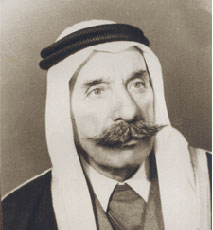SWEIDA, (ST) –Sultan Pasha al-Atrash, the leader of the great Syrian Revolution against the Ottoman occupation, was a symbol of patriotism since he believed in resistance as the only way to combat colonialism and restore usurped rights. The leader, who played a major role in the writing down of Syria’s history, was distinguished by the merits of a real national hero. His attitudes were an example to be followed mainly in terms of confronting the schemes which aimed to create sectarian disputes among the Syrians.
In 1910, he joined his father Thoqan al-Atrash in the battles against the Ottoman occupation mainly in al-Kafer battle in al-Swieda governorate .
In 1916 he decided to join the great Arab revolution against the Ottoman occupation, so he called on the Syrian revolutionaries to support their Arab brothers in their struggle against the Ottoman forces.
On September 30th of 1918, the Syrian leader entered Damascus via al- Meedan neighborhood gate and raised the Arab flag on the city’s government house building for the first time after 400 years of Ottoman colonialism.
Sultan Pasha was a good believer in national unity. His motto in his struggle against the French colonialism was ”religion is for God and homeland is for all”. His first statement was a call on all the Arabs to participate in the great Arab revolution regardless their religion or nationality.
Researcher Jamal abu Jahjah, in a book titled ”Sultan al-Atrash a Source of National Feeling ” said that the leader’s motto “religion is for God and homeland is for all” constituted a preface for the Syrian Revolution all over the homeland.
Abu Jahjah pointed out that Sultan’s letters to the Syrian revolutionaries aimed at consolidating national unity through rejecting sectarian calls and religious disputes.
The researcher added that Sultan’s potentials as a great leader and as a strong national hero appeared early in his life. He was adherent to national unity and he rejected sectarian calls and believed in armed resistance to restore usurped rights.
In a statement addressing the Syrian revolutionaries Sultan Pasha once said that “experience had proofed that strength was the only way to safeguard our rights, so we must fight if we want to live in dignity and freedom.”
The great leader never gave up in the face of the French colonialism. He was a staunch defender of Syria’s independence, sovereignty and territorial integrity, and he urged the Syrians to confront occupiers in his historical statement: ”to the weapon, to the weapon”.
Sultan Pasha al-Atrash called for electing a popular government and a special council for issuing new laws to safeguard citizens’ freedom and rights.
On August 2nd, 1925, he led a battle against the French forces which in turn launched a big military campaign to kill him and his fellows . The 400 Syrian fighters defeated the French forces in al- Mazraa, al-Mssafra, Rssas, and Um-al- Roman battles.
Sultan Pasha al- Atrash led the battles in coordination and cooperation with all the Syrian revolutionaries.
On October 25th 1925, he called for convening al- Sahra conference in al- Sahra valley area, aiming at preserving Syria’s independence.
It is to be noted that the leader was born in 1888 in al- Quraia village in southern al- Sweida governorate. His father, Thoqan Pasha al- Atrash was executed by the Ottoman authorities on March 5th, 1911 along with a number of other Arab hero fighters. The great leader died On March 26th, 1982.
Nahla Maaz

